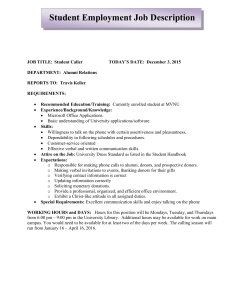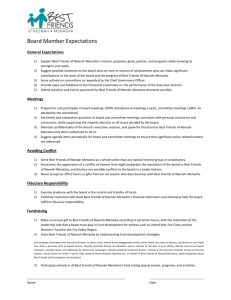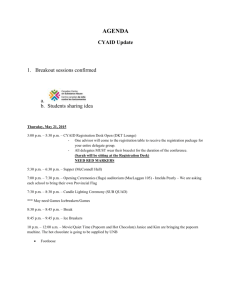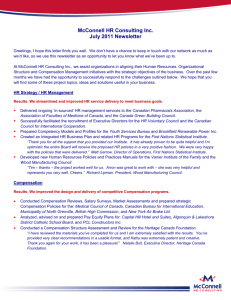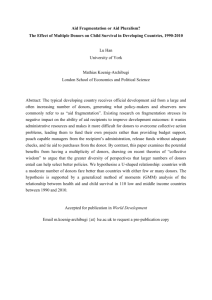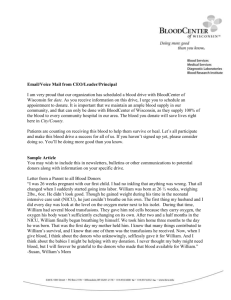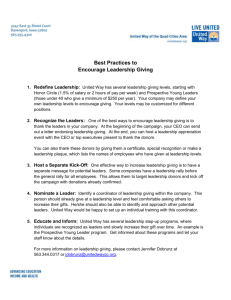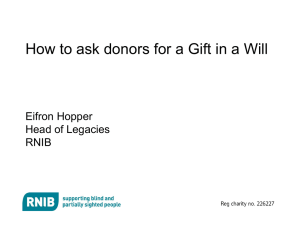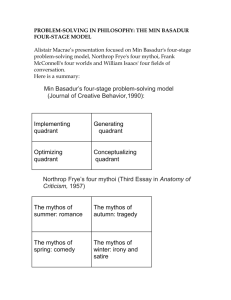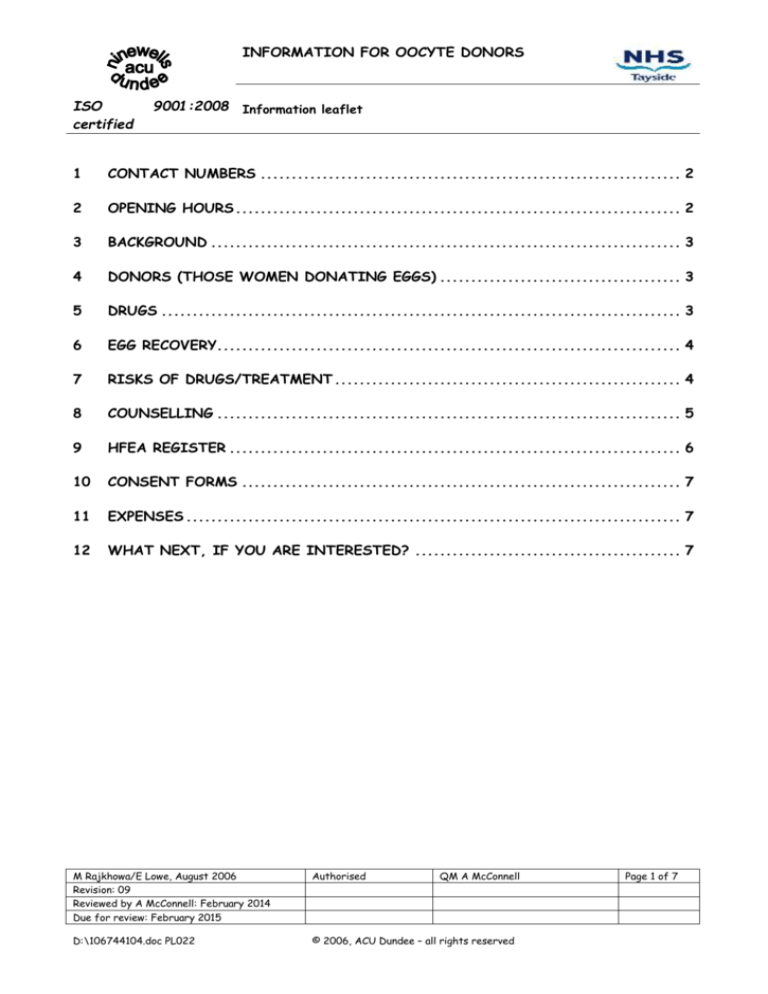
INFORMATION FOR OOCYTE DONORS
ISO
certified
9001:2008 Information leaflet
1
CONTACT NUMBERS .................................................................... 2
2
OPENING HOURS ........................................................................ 2
3
BACKGROUND ............................................................................ 3
4
DONORS (THOSE WOMEN DONATING EGGS) ....................................... 3
5
DRUGS .................................................................................... 3
6
EGG RECOVERY........................................................................... 4
7
RISKS OF DRUGS/TREATMENT ........................................................ 4
8
COUNSELLING ........................................................................... 5
9
HFEA REGISTER ......................................................................... 6
10
CONSENT FORMS ....................................................................... 7
11
EXPENSES ................................................................................ 7
12
WHAT NEXT, IF YOU ARE INTERESTED? ........................................... 7
M Rajkhowa/E Lowe, August 2006
Revision: 09
Reviewed by A McConnell: February 2014
Due for review: February 2015
Authorised
QM A McConnell
D:\106744104.doc PL022
© 2006, ACU Dundee – all rights reserved
Page 1 of 7
INFORMATION FOR OOCYTE DONORS
Information leaflet
1
CONTACT NUMBERS
Ward 35
01382 633835 (ansaphone outwith 8.00 am – 5 pm)
Anne McConnell
01382 632111 (ansaphone outwith 8.00 am – 5.30 pm)
Email anne.mcconnell@nhs.net
Appointments secretary
01382 496475 (8.45 am – 4.45 pm)
Emergency calls for medical staff outwith 8.00 am – 5 pm:
Mobile ‘phone 07774 694765. If there is no reply from this number, you should contact
the hospital switchboard (01382 660111) who will contact one of the consultant staff
for you.
2
OPENING HOURS
The Unit is open;
8 am to 5 pm Monday – Friday
8 am – 12 noon, Saturday and Sunday
M Rajkhowa/E Lowe, August 2006
Revision: 09
Reviewed by A McConnell: February 2014
Due for review: February 2015
Authorised
QM A McConnell
D:\106744104.doc PL022
© 2006, ACU Dundee – all rights reserved
Page 2 of 7
INFORMATION FOR OOCYTE DONORS
Information leaflet
DONOR OOCYTE IVF
3
BACKGROUND
Primary or premature ovarian failure has been estimated to occur in approximately 1% of
women. For such women their only hope of a pregnancy lies in the use of eggs donated by a
healthy female volunteer. The same technique may also apply to women whose ovaries have
been removed or where she is at risk of passing on some genetic disorder.
4
DONORS (THOSE WOMEN DONATING EGGS)
Healthy female volunteers are carefully selected and counselled. Some of these volunteers
approach the clinic directly wishing to donate eggs, while others after further discussion
agree to take part in an egg share programme.
All donors are screened for certain transmittable diseases such as HIV prior to being
accepted on to the programme, but it is emphasised that this is not a guarantee that the
patient is free of disease, which could in theory only become apparent after the screening
process. The risk of this is very small indeed. The physical characteristics of the donors are
recorded.
5
DRUGS
The donors undertake to use certain drugs including a series of injections to ensure the
development of more than one egg;
The drugs most commonly used in treatment cycles are:
1. Suprecur - a nasal spray that suppresses the hormones controlling the ovary. This is
referred to as downregulation and a scan will be carried out to confirm this has happened
M Rajkhowa/E Lowe, August 2006
Revision: 09
Reviewed by A McConnell: February 2014
Due for review: February 2015
Authorised
QM A McConnell
D:\106744104.doc PL022
© 2006, ACU Dundee – all rights reserved
Page 3 of 7
INFORMATION FOR OOCYTE DONORS
Information leaflet
before starting injections of Menopur/Gonal F to stimulate the ovaries.
Suprecur is
continued while you are having the injections.
2. Menopur/Gonal F - an injection that stimulates the ovaries. During stimulation, careful
ultrasound monitoring is necessary to assess the response of the ovaries by measuring the
number and size of the follicles. When the follicles, which should each contain an egg,
are the correct size you will be given another drug;
3. HCG - an injection which brings about final maturation of the eggs.
6
EGG RECOVERY
This is done using a vaginal ultrasound probe to guide a needle into each ovary. The fluid in
each follicle is then aspirated until oocytes are obtained.
This is all done under a light
sedation and we have an anaesthetist present at all egg recoveries. You will be able to go
home an hour or so after egg recovery.
7
RISKS OF DRUGS/TREATMENT
It is important to understand that few forms of medical treatment are entirely without
risk. The stimulation drugs can occasionally lead to over-stimulation and formation
of cysts which are temporary.
In about 5% of all cases, patients over-respond to the drugs with a condition called Ovarian
Hyperstimulation Syndrome. This usually settles without any specific measures but can very
occasionally become severe with very serious risks to your health. Should you at any time
feel that you have abdominal distension, pain, nausea or shortage of breath, then this could
indicate that you have developed this problem and you should be in contact with us directly or
with your own general practitioner, and do let him/her know that you are aware of the risk.
M Rajkhowa/E Lowe, August 2006
Revision: 09
Reviewed by A McConnell: February 2014
Due for review: February 2015
Authorised
QM A McConnell
D:\106744104.doc PL022
© 2006, ACU Dundee – all rights reserved
Page 4 of 7
INFORMATION FOR OOCYTE DONORS
Information leaflet
You can contact the Unit by telephoning the following:/
During office hours:
Out of hours:
01382 633835
Ward 35
01382 632111
Anne McConnell – Business Manager
01382 660111
Ninewells main switchboard
07774 694765
Mobile
01382 660111
Ninewells main switchboard - ask to speak
to Dr Kay, Dr Kini, Dr Martins da Silva or Dr Patravali,
failing that, to the Duty Gynae. Registrar
The technique of egg recovery could inadvertently damage organs close to the ovaries, such
as blood vessels, bowel or bladder. These complications are very rare but it is only right that
you should be aware of them. Bleeding or infection can also occur but are usually easily
managed.
8
COUNSELLING
Patients who are interested in being oocyte donors should note that we have an infertility
counsellor who is independent of the infertility unit, and who will be pleased to talk with you.
Her name is Mrs Anne Chien and appointments can be made by contacting the appointments
secretary on (01382) 496475.
Implications counselling will be organised for patients who are considering treatment which
involves either donating (including sharing) or using donated eggs, sperm or embryos and also
for those considering surrogacy.
Implications counselling enables you to consider your
thoughts and feelings about the complex emotional, practical and ethical issues around such
M Rajkhowa/E Lowe, August 2006
Revision: 09
Reviewed by A McConnell: February 2014
Due for review: February 2015
Authorised
QM A McConnell
D:\106744104.doc PL022
© 2006, ACU Dundee – all rights reserved
Page 5 of 7
INFORMATION FOR OOCYTE DONORS
Information leaflet
treatment in a supportive way. You will be encouraged to consider how you might manage the
information around donation or surrogacy and how that might impact on yourselves, any child
born as a result and on others involved in your treatment. Each counselling session lasts
around an hour and your counsellor can help you to decide about further appointments. This
counselling is not an assessment, it is to help you make a fully informed decision about your
treatment.
9
HFEA REGISTER
The Human Fertilisation and Embryology Authority (HFEA) keeps a confidential register of
information about donors, patients and treatments. This register was set up on 1st August
1991 and therefore contains information concerning children conceived from licensed
treatments from that date onwards.
As from the year 2008, people aged 16+ (if contemplating marriage) or 18, who ask the HFEA,
will be told whether or not they were born as a result of licensed assisted conception
treatment, and if so, whether they are related to the person they want to marry.
Until 2005, donors could choose to remain anonymous and, although they had to give
identifying details for the HFEA register, these remained confidential. However, on 1st April
2005, the law changed to allow people conceived through donation to find out who the donor
was, once they reach the age of 18; these changes only apply automatically to donations made
after 1st April 2005.
Please refer to the enclosed information leaflet ‘What you need to
know about donating sperm, eggs or embryos’, produced by the HFEA.
10 CONSENT FORMS
M Rajkhowa/E Lowe, August 2006
Revision: 09
Reviewed by A McConnell: February 2014
Due for review: February 2015
Authorised
QM A McConnell
D:\106744104.doc PL022
© 2006, ACU Dundee – all rights reserved
Page 6 of 7
INFORMATION FOR OOCYTE DONORS
Information leaflet
We will ask you to complete consent forms which are required under the Human Fertilisation
and Embryology Act, 1990. These forms give your authorisation for the use of your eggs and
storage of any embryos created by your eggs. You are entitled to withdraw consent at any
time up to the time of transfer of any embryos.
11 EXPENSES
Egg donors can be compensated £750 (this includes expenses) for a cycle of treatment. This
will be paid at the end of your treatment cycle.
12 WHAT NEXT, IF YOU ARE INTERESTED?
If you would be interested in being a donor, or hearing more about it, then the next step
would be to have a talk with one of the medical staff of the Assisted Conception Unit. Anne
McConnell is the business manager and her telephone number is 01382 632111. She would be
pleased to set up an appointment for you.
M Rajkhowa/E Lowe, August 2006
Revision: 09
Reviewed by A McConnell: February 2014
Due for review: February 2015
Authorised
QM A McConnell
D:\106744104.doc PL022
© 2006, ACU Dundee – all rights reserved
Page 7 of 7

